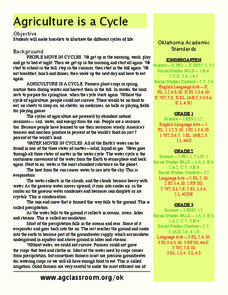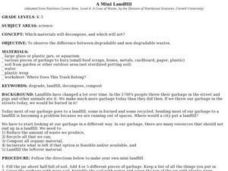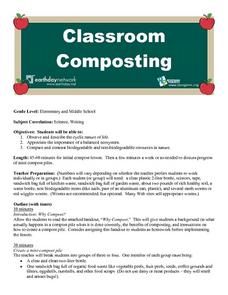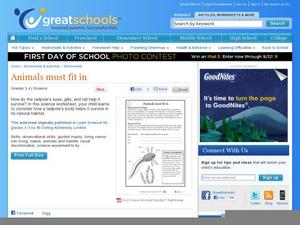Curated OER
Decomposers- Nurse Logs
Young scholars investigate temperate forest ecosystems. In this environmental lesson, students discover different forms of decomposition and its effect on the environment.
Kentucky School for the Deaf
Levels of Organization within an Ecosystem
From tiny organisms to entire biomes, young scientists examine the interdependent relationships tying all living and non-living things together with this collection of ecology resources.
Curated OER
The good microbes
The question posed for the class to consider; What would decay and what would not? They read the short passage on decomposition and microbes, then mark the items that would decay after a two-week period. A scientific investigation idea...
Curated OER
Agriculture is a Cycle
Students explore cycles in nature. In this cross curriculum agriculture instructional activity, students define "cycle" and research weather and planting folklore. Students make a bracelet in which individual colored beads represent the...
Curated OER
Compost in a Bag!
Fourth graders experiment to see which objects decompose. In this compost instructional activity, 4th graders observe the changes of labeled objects in a bag. Leave the objects for one month and record the changes by observation and...
Curated OER
A MINI LANDFILL
Learners observe the difference between degradable and non-degradable wastes. They create their own landfill in a jar by adding four or five pieces of garbage and then covering it with dirt and water. They make observations on what they...
Curated OER
RIDE THE WILD LEAF
Students identify and interpret that leaves provide food for new trees and plants. Students cut out leaves and glue them on the appropriate
number on included worksheet. Students collect different types of leaves and make leaf rubbings....
Curated OER
Classroom Composting
Students discover the benefits of composting. They identify the steps of decomposition as well. They are read a book and discuss what items decompose.
Curated OER
Everything's Connected
Learners explore how trash decomposes. In this ecosystem lesson, students discuss new vocabulary words, such as producers and consumers, and think critically to answer how landfills work.
Curated OER
Rainforest Vocabulary Words: Week 1
In these rainforest vocabulary worksheets, read the definitions and the matching terms for the following rainforest vocabulary terms: decomposers, deforestation, epiphytes, extinct, environment, pollute, vegetation, ecology, climate,...
Curated OER
Ecosystem Energizers
Fourth graders see how the flow of energy through an ecosystem made up of producers, consumers, and decomposers carries out the processes of life and that some energy dissipates as heat and is not recycled.
Curated OER
Permafrost: Permanently Frozen Ground
Students explore permafrost. In this 3 states of matter lesson, students identify characteristics of solids and liquids. Students observe water and soil melting and freezing at various temperatures. Students make...
Curated OER
Forests
Middle schoolers examine soil in forests looking for animals and insects. They divide the animals based on their number of legs and draw the animal they have collected.
Curated OER
Making a Mini-Landfill
Students create a mini-version of a landfill. They examine the materials they use everyday and determine if they decompose or not. They identify the materials as renewable or nonrenewable as well.
Curated OER
The Rotten Truth
Learners study the process of decomposition using lunch leftovers and soil. They complete the inquiry over set periods time as they observe the how composting takes place and finally, they sort the materials into biodegradable,...
Desert Museum
Daisy Ecology
Here's a fine lesson that combines poetry with life sciences. Learners carefully listen to a poem that's all about a food chain. As the poem is read, learners name the producer, the herbivore, the carnivore, and the omnivore. Lots of...
Curated OER
Organic and Inorganic Waste
Students conduct a scientific investigation about organic or inorganic waste. In this organic or inorganic waste lesson, students create a compost heap to determine the difference between inorganic and organic waste. Students...
Captain Planet Foundation
Energy Flow in the Garden
How can you tell what an owl has eaten? Study the food chain and flow of energy in an ecosystem by dissecting an owl pellet and noting the bones found inside. Additionally, the lesson includes a game about consumers and producers with a...
Forest Foundation
The Nature of Trees
Young botanists examine the different parts of tress and then draw parallels between the functions of these parts and the function of parts of the human body.
Curated OER
Animals Must Fit In
A instructional activity on tadpoles is here for your young biologists. Learners read a short paragraph on tadpoles, then answer three questions regarding how parts of their bodies help the tadpole to survive in the pond. There is a good...
Curated OER
Dinnertime for Animals
Is a deer an herbivore? What about a spider? Experiment with the food chain in an interactive science experiment. After listing the herbivores from a selection of animals, third and fourth graders compare the skulls and teeth of...
Curated OER
Where Does Your Garbage Go?
The objective of this lesson is to teach students about the importance of recycling. Initially, students have a chance to think about their impact on our planet by following the path that garbage takes. Students then learn about how...
Curated OER
Red Wigglers
Students are introduced to the benefits of using Red Wiggler worms to produce compost. They identify the requirements for the worms and the methods to follow in order to produce compost. They draw a picture of a functioning worm bin.
Curated OER
The Human Impact on the Environment
Despite the typos and formatting issues, the Word document found here has some great potential. There are two questions that ask learners to put several events in a logical order; these could easily be made into a card sort activity....

























